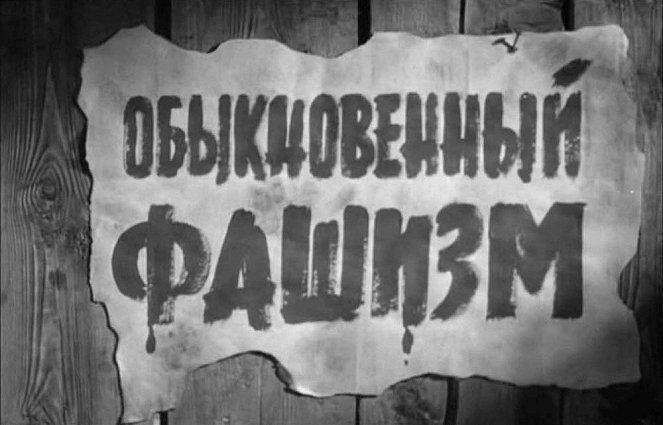Directed by:
Mikhail RommScreenplay:
Mikhail RommCinematography:
German LavrovCast:
Mikhail Romm (narrator), Marlene Dietrich (a.f.), Joseph Goebbels (a.f.), Hermann Göring (a.f.), Adolf Hitler (a.f.), Joseph Vissarionovich Stalin (a.f.) (more)Plots(1)
This documentary attempts to investigate the sources of fascism. It is still one of the most powerful antiwar and antifascist movies. The authors consider the nature and rise of fascism, the reasons for its appearance in Germany, the birthplace of Goethe and Mann. What forces brought odious poorly educated people to power? The documentary uses German archival footage, material shot by Hitler's personal photographer, images of concentration camps where thousands of people perished, tortured to death by the Nazis. (Moscow International Film Festival)
(more)Reviews (2)
Local intellectuals and historians, of course, in 80% of cases, do not comment on the film, but rather express their opinions on the nature of regimes and states, totalitarianism, etc. I did not want to, but I have to ask three questions to everyone who thinks that the USSR and Nazi Germany were the same: 1) How is it possible that a totalitarian regime could perfectly capture the essence of Nazi dictatorship when it would be exposing itself? In that case, the USSR would destabilize itself in front of the eyes of its citizens = viewers, which would put it in a peculiar contradiction, because as a proper totalitarian regime, it should eliminate any signs of its own degradation, imperfection, etc. and eliminate its critics, who would essentially become M. Romm. And not to make that movie at Mosfilm! /// 2) Related to the first question: When I criticize another person for their bad behavior and behave the same way myself, I cannot accurately and insightfully uncover the reasons for the badness of their behavior from a psychological or any other perspective. In other words, how is it possible that the USSR accurately described Nazism when it was to have behaved the same way and the true causes of its own behavior should have been hidden from it, as objective assessment is only capable of by a non-totalitarian consciousness? /// 3) This film is precisely an example that the USSR was capable of self-reflection: after all, criticism of Stalin's cult could not be avoided due to the description of Mussolini/Hitler, and yet it is captured very suggestively in the film, even though it must have been clear that every Russian would recognize it just 12 years after Stalin's death! How is it then possible that totalitarianism changes and criticizes itself when it is supposed to be all-powerful and unchanging, as it is, after all, totalitarian and controls everything and everyone and therefore has no reason to change?
()
Year after year, Triumph Over Violence makes themes more ironic that don't need the arrogant context of 1960s timelessness to be more relevant. With each rerun I grow more tired, Horníček's commentary shifts the whole meaning somewhere else, the rarity of some of the period material is overwhelmed by the assessment of the allegedly too plump thighs of the German actresses. What was meant to be funny is awkward, and what was meant to be enlightening is merely naive. Although not as jovial in the original, Romm's appeal at the time completely fails to resonate today.
()
Gallery (4)
Photo © Moscow International Film Festival


Ads